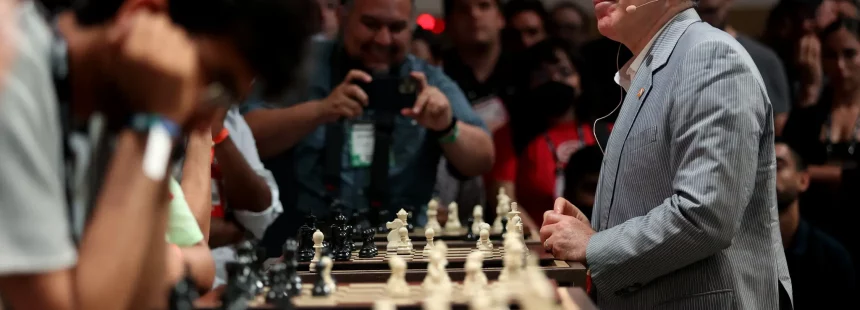

This article is a reprint. You can read the original at the New York Times.
By Blake Hounshell
“It’s been 17 years since Garry Kasparov, a child of the Soviet Union who became a grandmaster at age 22, stepped down from the world of competitive chess.
Bruce Pandolfini, who wrote a book on Kasparov’s showdown with Deep Blue, the IBM chess computer, described his play this way: “Even when he can’t calculate the end result conclusively, he can make sophisticated generalizations.”
Kasparov, now an activist and author, sees a world rife with dangers to democracy — and he is determined to do something about it.
And though he professes to dislike comparisons between his brand of chess and his brand of geopolitical analysis, Kasparov takes pride in seeing what he calls the “big picture” of rising authoritarianism and democratic malaise. In a prescient 2015 book that, as he reminded me, The New York Times dinged in a review at the time as “somewhat tedious,” he urged Americans to take Vladimir Putin’s threats seriously.
“My strength in chess was the big picture,” Kasparov said in an interview on Tuesday. “I could look at the position and see how things connected to one side or the other.”
Kasparov’s latest gambit is promoting what he views as two essential, connected ideas: that Putin’s war in Ukraine is a war for democracy itself, and that Western democracies are in peril unless their citizens fight for democratic values at home.
“I grew up in the Soviet Union, so I experienced undemocratic rule,” Kasparov said. “And while I never thought America was even close to this kind of desperation, when you look at history, the real threat in democracy comes when you have polarization.”
With Russia’s war effort flagging in Ukraine, Kasparov senses “panic” among authoritarian leaders from North Korea to Venezuela, because, he said, they view Putin as a man with “almost mystical powers.”
Here in the United States, Kasparov said, “It also could be a great moment for us to revise our commitment to democracy,” adding, “Because, let’s be honest, there was complacency.”
“We’re fighting the devil right now,” said Hennadii Nadolenko, an adviser to the Ukrainian minister of foreign affairs who has worked with Kasparov’s group to brief Americans on the war. “Without U.S. help, we couldn’t survive.”
Last year, Renew Democracy teamed up with CNN on “Voices of Freedom,” an editorial series that involved dissidents from around the world telling their stories. The group also organized an open letter, signed by 52 dissidents from 28 countries, warning that “to win the global fight against authoritarianism, America must once again believe in and live up to its own values.”
A green-card holder with a Croatian passport, Kasparov said that he and other dissidents had an “objective” vantage point on U.S. democracy that gave them the credibility to speak difficult truths.
When we talked, Kasparov was feuding online with Elon Musk, the Tesla founder. On Monday, Musk floated a 280-character proposal to end the war in Ukraine that, to Kasparov, seemed too friendly to the Kremlin. He called Musk’s proposal “moral idiocy.”
The exchange was typical of two Kasparov traits: A combative polemical style and a conviction in the righteousness of his own beliefs. His frank criticism of six U.S. presidents, Barack Obama and Donald Trump included, has at times alienated one side or another. But that, he said, had only reinforced his concerns about political polarization.
Kasparov’s response to Americans of all stripes is that although their democracy may be teetering, it’s still a beacon of hope to millions around the world. And as the war in Ukraine shows, maintaining it requires constant vigilance.
“You have to be an active member of society,” he said. “You have to be engaged. That is the message.””

